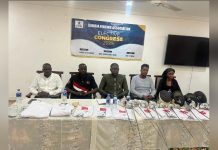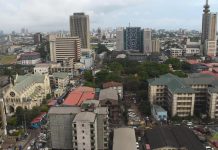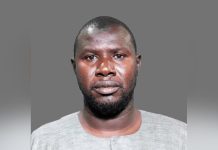By Mohammed Jallow
Africa-Press – Gambia. The Gambia stands today at a pivotal crossroads… After years of authoritarian rule under Yahya Jammeh and his regime, Gambians took a bold step in 2016–17 toward renewal. We entered a chapter of hope: a promise to rebuild our institutions, to re-define our governance in line with rule of law, human rights and democratic constitutionalism. Yet, more than six years into this transition, we find ourselves facing a dual reality: promising reforms on one hand, and entrenched structural challenges on the other. It is time to speak candidly and call into collective action those charged with the stewardship of our nation.
1. The imperative of constitutional reform
Our current Constitution, adopted in 1997 under the shadow of military coup and authoritarian rule, remains inadequate to guide the country through this new era of democratic hope. It bears the legacy of a system designed for centralized power, weak accountability and limited checks on the executive. Scholars have noted that our constitutional reform process, though launched with high expectation, has become a paradox of promise and postponement.
Without constitutional clarity and legitimacy, governance remains hostage to uncertainty and power politics. We cannot move forward sustainably unless the bedrock of our governance is both credible and widely accepted.
2. Governance & human rights progress and unfinished business
There is no denying that the post-Jammeh era under Adama Barrow has brought improvements: greater media pluralism, improved freedom of expression and assembly, and nascent efforts toward judicial independence. Yet these are fragile gains. The previous decades of repression left deep institutional damage: a judiciary weak in resources and independence, executive power often unchecked, and a political culture accustomed to fear and manipulation.
Key human rights issues continue to bedevil our society. The legacy of arbitrary detention, intimidation of media and civil society, disregard for rule of law and impunity for abuses has not yet been fully confronted or redressed. While the establishment of the Truth, Reconciliation and Reparations Commission (TRRC) was a necessary first step, true healing demands follow-through: accountability, reparations, institutional reform and societal reconciliation.
Moreover, governance remains uneven: access to essential services, state capacity, and infrastructure remain concentrated in urban areas leaving rural communities behind. We cannot speak of credible democracy if large swathes of our population remain marginalised, voiceless and vulnerable.
3. Political pluralism and fragmentation both opportunity and risk
The emergence of multiple political parties, break-away factions and new formations can, in one light, be taken as a healthy indicator of political pluralism. The notion that citizens and leaders may choose new vehicles to articulate their aspirations is positive. But there is another angle: the proliferation of parties without coherent ideology, institutional discipline or national vision can deepen fragmentation, weaken governance and exacerbate polarisation.
In The Gambia we are witnessing exactly this: some parties break away not as the result of ideological evolution, but because of intra-elite betrayal, patronage, personality clashes, or perceived exclusion. The result is a political terrain often hostile, acrimonious and trust-deficient where former allies become competitors, and the national agenda becomes lost in transactional debate.
Polarisation of society is real. Social healing, reconciliation and national unity cannot thrive if political competition is seen solely as a zero sum game of winners and losers. The wounds of the past of dictatorship, of injustice, of exclusion still run deep. We cannot heal them by pretending they do not exist.
4. The baggage of the past and the continuing role of former power networks
We cannot ignore that the heavy legacy of the Jammeh era continues to weigh on our institutions, our society and our political culture. The concentration of power, the fear of retribution, the manipulation of state apparatus for personal or factional advantage these habits do not vanish overnight. They persist in informal networks, in mindsets, in institutional practices.
National healing demands that democratic custodians take account of the actions of past power-holders through truth-seeking, reparations, accountability and transformation of institutions that enabled impunity. If we do not face our past honestly, it will continue to shape our future in destructive ways.
5. Sectoral development depends on governance reform
Here is where your work as consultants, trainers, policymakers and business-leaders becomes central: the quality of governance, respect for human rights and credible constitutional foundations do not exist in the abstract. They determine whether sectoral development in health, education, finance, trade, environment, youth empowerment and beyond will succeed or fail.
If a government lacks institutional reliability, private investment is hesitant. If the rule of law is weak, contracts become risky. If rights are not protected, citizens cannot participate fully in economic life and the most marginalised remain excluded. The rise of multiple political parties without institutional coherence means policy discontinuity, unpredictability and governance instability. All this undermines development efforts.
For example, training programmes you seek to deliver will struggle in areas where the local authority is weak or lacks legitimacy. Recruitment services will face challenges in environments where rule of law and contract enforcement are uncertain. International trade facilitation demands predictable governance and clear regulatory frameworks something we still lack in key areas because constitutional reform remains unfinished.
6. A clarion call to all custodians of democracy
To all democratic custodians executive, legislature, judiciary, civil society, private sector and international partners I issue this call: Let us step into leadership together, with humility, courage and vision. The tasks before us are not easy, but they are urgent:
· Complete constitutional reform as a national priority. A people-centred process of consultation, consensus-building and drafting must be pursued. The drafting must be transparent, inclusive of minority and marginalised voices, guided by human rights and international norms. The current impasse must end.
· Strengthen institutions of accountability ombudsmen, human rights commissions, independent judiciary, free media. The culture of impunity must end if we are to have genuine democracy.
· Address the legacy of the past: ensure the TRRC’s recommendations are implemented fully; support reparations and healing; ensure that leaders and former power-holders are held to account not for revenge, but for justice and closure.
· Promote unity and reconciliation: Political competition must not destroy our social fabric. We must foster dialogue, national healing, inter-party cooperation and a shared vision for national development. Leaders must model behaviour that elevates the national interest above personal or partisan gain.
· Embed rights and inclusion in sectoral development: Youth, women, rural communities, persons with disabilities and religious minorities must be central to all reforms. Development is meaningless if large groups remain excluded.
· Ensure transparency and participation in governance: Every citizen must be a stakeholder in the democratic system not just electoral fodder. Mechanisms for public consultation, oversight and participation must be institutionalised.
· Promote accountability for political parties: New parties are welcome, but they need to be rooted in genuine ideology, institutional integrity and public service not merely vehicles for personal ambition. Electoral laws, party funding and public oversight must be reformed accordingly.
· Build capacity and leadership at all levels: From rural councils to national ministries, the quality of governance depends on leadership and competence. Training, mentoring and resources must be directed to uplift institutional capacity, with the private sector, NGOs and international partners playing their part.
7. Leadership, hope and mobilisation
As a Gambian, I firmly believe that the promise of our country remains immense. We are small in size yet rich in human capital, cultural diversity and geographical potential. But promise in itself is not enough. Leadership must turn promise into practice. Our political leaders must rise above self-interest. Our institutions must serve the citizen. Our nation must walk the path of integrity, justice and shared prosperity.
To the President, to the Speaker of the National Assembly, to party leaders, to civil society elders, to the private sector and to every citizen: This is your moment. The moment when you will either rise to meet your historic responsibility or allow our transition to drift into another cycle of reform deferred, rights compromised and youth aspirations disappointed.
I call on you to lead with courage. I call on you to hold one another to account. I call on you to make governance not a matter of political survival, but of public service. I call on you to view human rights not as an optional add-on, but as the foundation of every policy, programme and institution. I call on you to make constitutional reform not a distant goal, but an immediate priority.
Our children, our poor, our rural communities, our disenfranchised and our future demand nothing less. The pride of our nation demands nothing less. Let us not waste this critical moment. Let us seize it. Let us act.
Source: The Standard Newspaper | Gambia
For More News And Analysis About Gambia Follow Africa-Press






